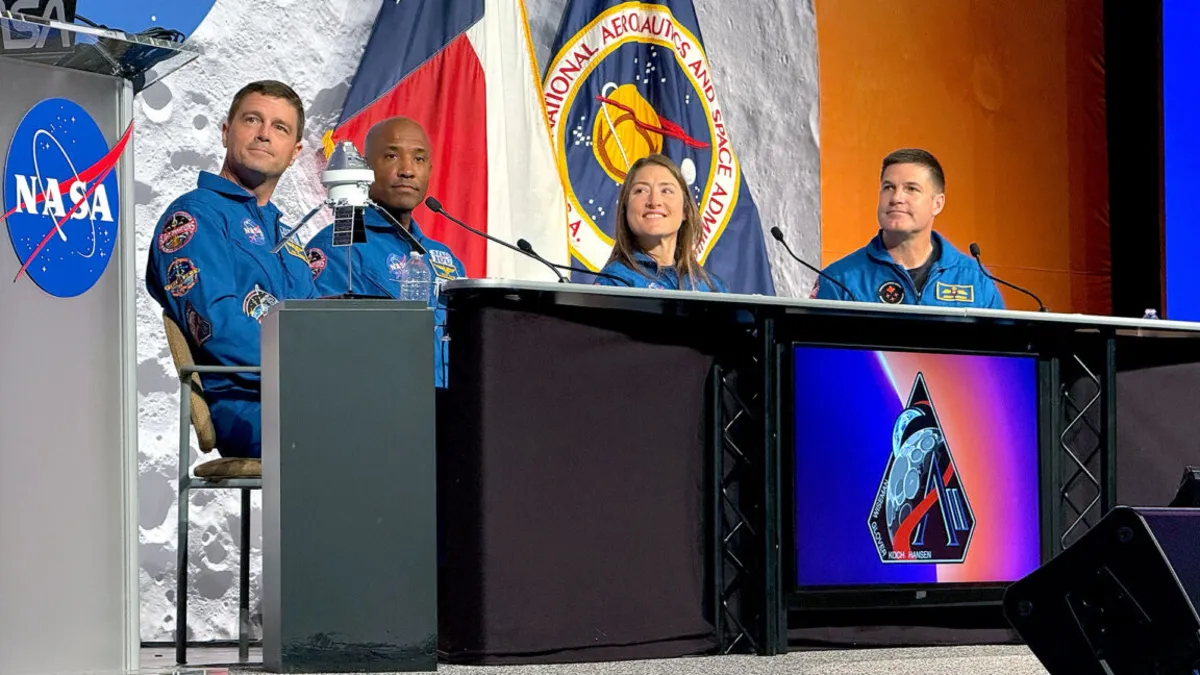
The first astronauts destined to fly to the Moon in over 50 years will embark on their historic journey aboard a spacecraft named Integrity. NASA's Artemis II crew unveiled the name of their Orion spacecraft during a recent press conference held at the Johnson Space Center in Houston. Commander Reid Wiseman emphasized the significance of naming the spacecraft, stating, “We thought, as a crew, we need to name this spacecraft. We need to have a name for the Orion spacecraft that we're going to ride on this magical mission.”
Historically, naming spacecraft has played a crucial role in Nasa missions. During the Apollo program, which aimed to send astronauts to the Moon, crews would choose names to differentiate their spacecraft—the command and service module and the lunar module—while on separate flights. As technology evolved, vehicles like NASA's space shuttle orbiters and SpaceX's Dragon capsules adopted names to engage the public and imbue each craft with a sense of character. With Artemis, Wiseman sought a name that would not only encapsulate their mission but also symbolize their success. “We're bringing together the world,” he remarked, highlighting the collaborative spirit of their endeavor.
The Artemis II crew experienced an abundance of ideas during their naming discussions. Quarantined in the same facility prior to their anticipated launch in early 2026, Wiseman, pilot Victor Glover, mission specialists Christina Koch and Jeremy Hansen, along with their backups, Andre Douglas and Jenny Gibbons, brainstormed extensively. “We had all kinds of things,” Koch shared in an interview. “We had sentences, phrases, light-hearted monikers, mantras, and geographical names. Everything was on the table. We really wanted it to be a completely open forum.”
Ultimately, the name Integrity was inspired by a profound statement made by one of their instructors during a team-building trip to Iceland. Hansen, a Canadian Space Agency astronaut, explained, “He coined this for us, and we held on to it. It was this idea that you're not a person who has integrity; you're a person who strives to be in integrity. Sometimes you're out of integrity, and sometimes you're in your integrity.” This concept resonated deeply with the crew.
Glover elaborated on the importance of the name, noting its Latin root, which means 'whole.' “It’s a very simple concept, and it’s about being whole,” he stated. “This crew comes together as pieces—the four of us and our backups—but the six of us make up a whole team. The vehicle, the pieces come together and make up a whole spacecraft.” He also highlighted the broader implications of integrity, stating, “What people anecdotally say is that integrity is what you do when no one’s watching. That, and truth, honor, and integrity matter.”
The concept of Integrity aligns closely with the Astronaut Code of Professional Responsibility and is also a core value of the Canadian Space Agency. Koch remarked, “We all strive to be in integrity all of the time, but integrity isn’t an absolute that you either have or don’t have. So this helps us give grace and build trust with each other.” She expressed hope that those following the mission would appreciate the multifaceted meaning of the name, emphasizing the themes of wholeness and wellness that humanity needs. Glover echoed this sentiment, stating, “We need to hear more of that togetherness and wholeness.”
With the name Integrity officially announced, the next step for the crew is to adopt it as their potential call sign. Glover explained, “We waited to make sure the whole enterprise was ready for us to announce it before we even used it. I think we'll start using it in sims: ‘Houston, Integrity. Integrity, Houston.’” He added that if the crew decides against using the name, they can always revert to calling the spacecraft Orion.
The Artemis II mission represents a significant milestone in space exploration, and the name Integrity serves as a powerful symbol of the crew's commitment and unity as they prepare for their groundbreaking journey to the Moon.